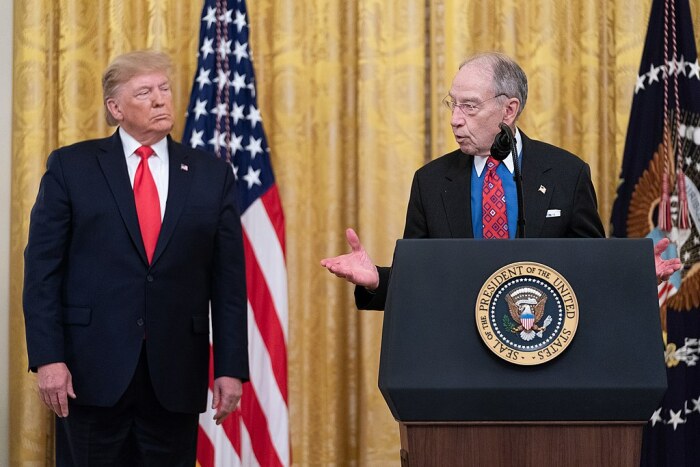U.S. Senator Chuck Grassley told reporters on September 22 that associates of President Donald Trump did not attempt to enlist him in a plan to declare Trump the winner of the electoral vote on January 6.
In their new book Peril, Bob Woodward and Robert Costa were first to report on a memo Trump’s attorney John Eastman drafted, which claimed that Vice President Mike Pence “(or Senate Pro Tempore Grassley, if Pence recuses himself)” could reject slates of electors from seven states that voted for Biden. Then the presiding officer could declare Trump re-elected, or that since no candidate received 270 electoral votes, the election should be decided in the U.S. House, where Republicans control 26 state delegations.
A longer memo by Eastman, which laid out the same strategy for subverting the peaceful transfer of power, does not mention Grassley.
Legal scholars have widely denounced Eastman’s readings of the U.S. Constitution and the Electoral Count Act. J. Michael Luttig, a Republican and former U.S. Appeals Court judge, advised Pence “that he had no choice on January 6, 2021, but to accept and count the Electoral College votes.” Luttig argued that Eastman “was incorrect at every turn of the analysis in his January 2 memorandum.”
Upon reading the memo, I wondered whether Eastman or anyone else in Trump’s inner circle tried to recruit Grassley to execute this attempted coup. Like every Republican who represents Iowa in Congress, Grassley voted on January 6 to certify Joe Biden’s electoral college victory. He said in a statement that under the U.S. Constitution and federal laws, “Congress has no role in conducting elections or adjudicating election disputes, only receiving and formally counting the electoral votes cast in each state.”
However, Grassley raised eyebrows when he said on January 5 that he would be presiding over Senate proceedings the following day “if the Vice President isn’t there and we don’t expect him to be there […].” Staff later walked back those comments, saying Grassley meant only that Pence was unlikely to be present during Senate debate over the 2020 election results.
Since Grassley’s staff do not allow me to participate in his conference calls, I was unable to ask the senator about this week’s revelations. Fortunately, some other journalist raised the issue. James Q. Lynch reported for the Cedar Rapids Gazette,
Grassley was unaware of the Eastman memo, he said, and was not approached by Trump associates attempting to convince him of their strategy should he be the one presiding over the certification.
“I have not even read the story, so I don’t even know what the story says,” Grassley told reporters during his weekly news call. “But the answer is no. I have not been approached in the situation as you described it.”
Later Wednesday [September 22], his staff said a search of correspondence and call records showed the senator had no conversations about any plan to reject the Electoral College results. The recent reporting on the Eastman memo is the first Grassley and his staff have heard about it, a staffer said.
In official statements and communications with constituents this year, Grassley has drawn false equivalencies between Trump’s attempts to stay in office after losing an election and a handful of Democrats’ objections to a few states’ electoral slates in 2001, 2005, and 2017.
Top image: President Donald Trump looks on as Senator Chuck Grassley speaks during a federal judicial confirmation milestones event at the White House on November 6, 2019. Official White House photo by Shealah Craighead available via Wikimedia Commons.

